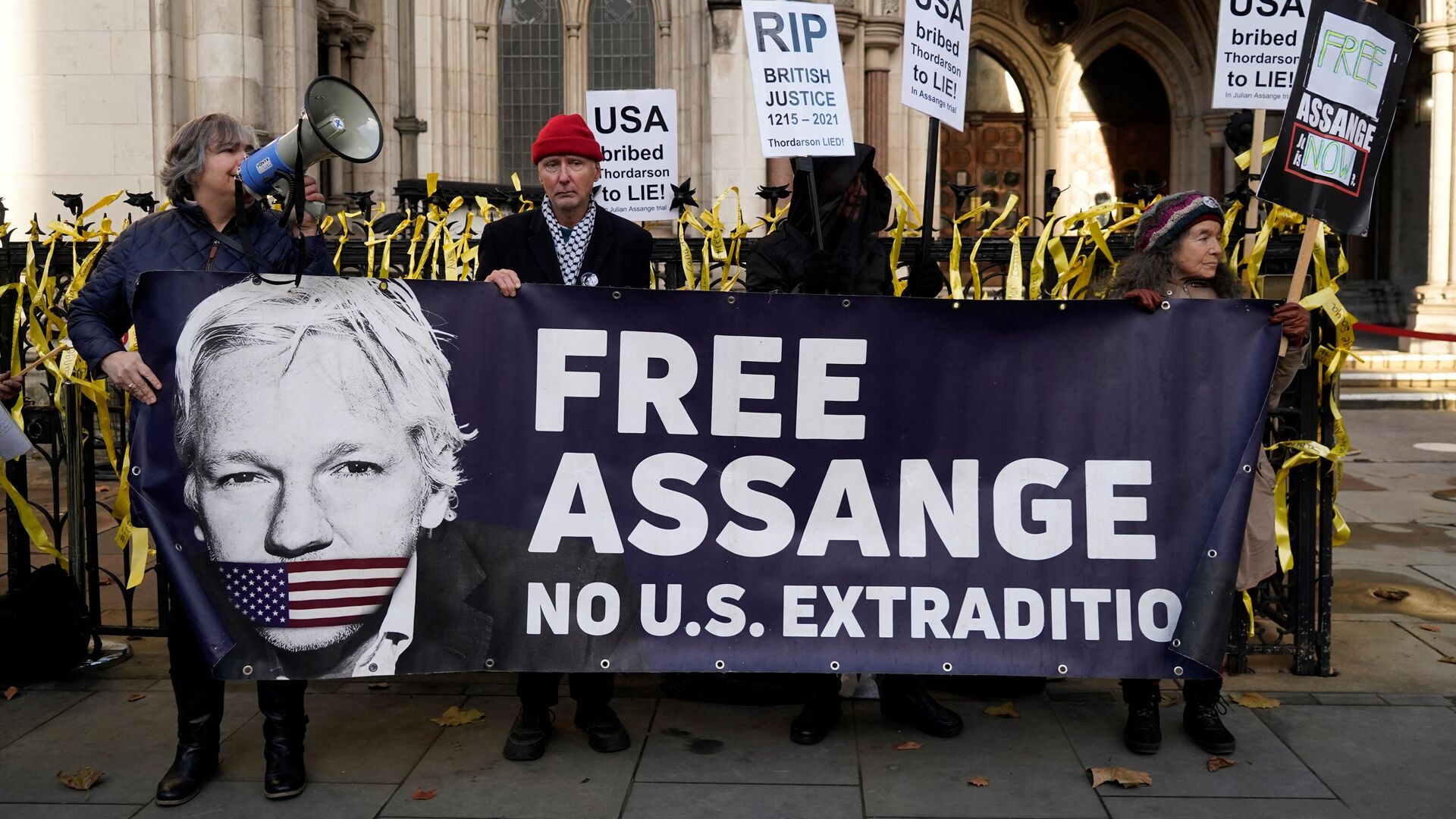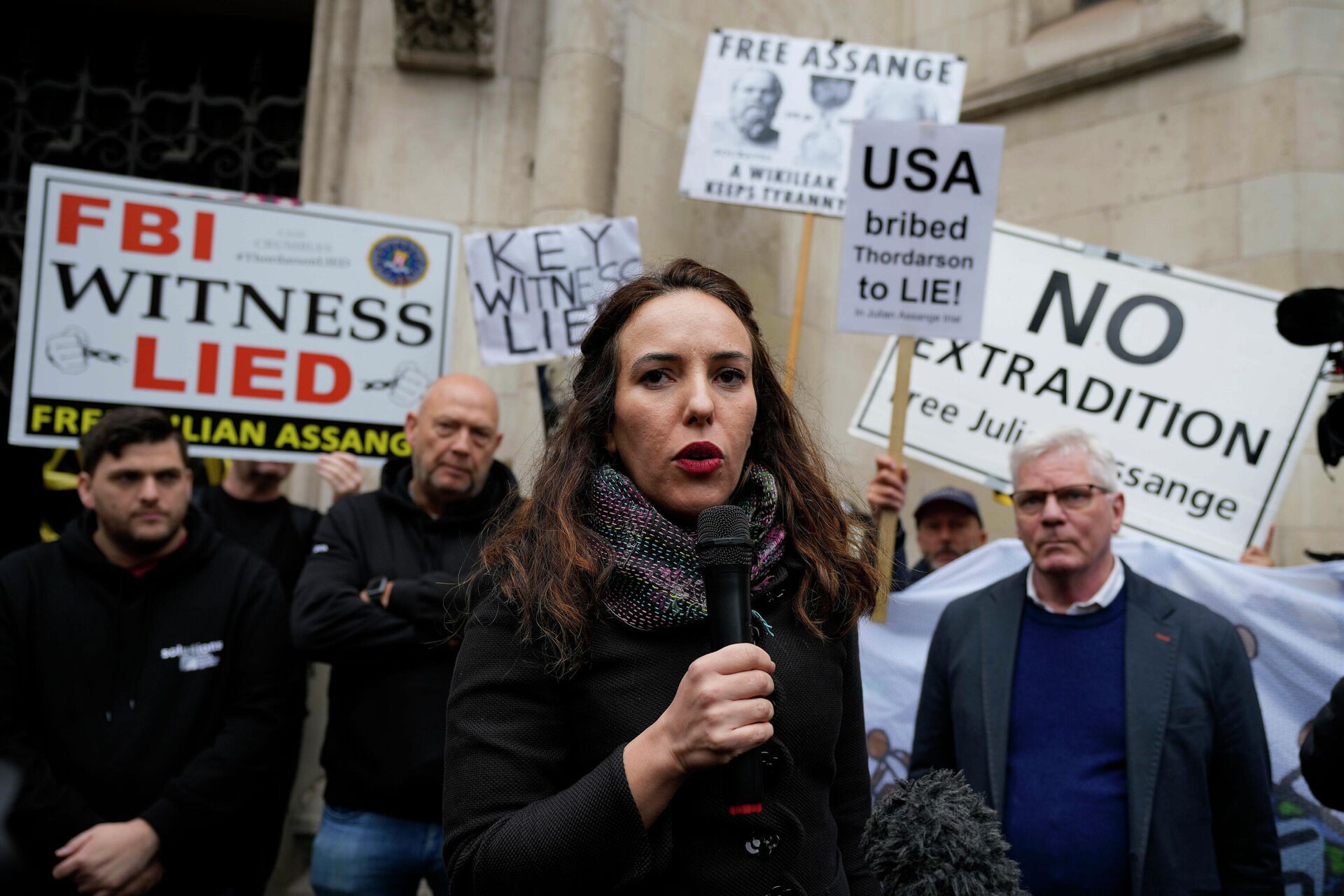Scholars: Promoting Human Rights While Extraditing Assange Brings West's Legal System Into Question
19:10 GMT 20.04.2022 (Updated: 15:19 GMT 28.05.2023)

© NIKLAS HALLE'N
Subscribe
The London court on 20 April made a formal decision to extradite Julian Assange to the United States. Should the WikiLeaks founder be extradited to the US, where he is charged with espionage, he would face up to 175 years behind bars.
"The decision of the Westminster Magistrates' Court to extradite Julian Assange to the United States astounds me," says Andy Vermaut, Belgian human rights activist of the International Alliance for the Defence of Rights and Liberties. "I expected the UK to consider the core fundamental rights and human rights treaties it has signed, particularly the civil and political rights it has ratified. I think there are still legal avenues open to fight this judgement further."
Assange is indicted by the US on 18 federal charges carrying a maximum sentence of 175 years in jail over alleged espionage and hacking which resulted in the publication of classified Afghan and Iraq war logs and State Department cables by WikiLeaks. The bombshell materials shed light on US troops' conduct and alleged war crimes in Afghanistan and Iraq. The WikiLeaks founder's legal team has long insisted he should be entitled to First Amendment protections of freedom of speech since he acted as a journalist.
According to Vermaut, in this case, the US judiciary serves "as both a judge and a party." The Belgian human rights activist expresses concerns whether Julian Assange will be able to have a fair trial given the huge political pressure on the judges who will have to rule on him there.
"I regard Julian Assange to be a journalist, and I believe that a journalist who has done his job in good conscience, informing people as best he can about the horrors committed by the US in Afghanistan and Iraq, should be honored with a monument and treated as a VIP for his bravery and energy," highlights Vermaut. "We observe Press Media Freedom Day in early May. I believe we should also include Julian Assange, who gave his life to get us closer to the truth."
Assange looming extradition is a shocking situation for all journalists throughout the globe who are fighting for freedom of information, according to Vermaut.
"Journalists everywhere should be concerned about the future of the free press," agrees Taylor Hudak, journalist and editor at AcTVism Munich. "Journalists, in particular, who publish national security related information that is not favorable to the United States may self censor as a result of the ongoing proceedings against Assange to prevent from experiencing his same treatment. This sends a message to the world that the United States doesn’t value adversarial journalism."

CAPTION CORRECTION SURNAME Julian Assange's partner, Stella Moris, addresses protestors outside the High Court in London, Wednesday, Oct. 27, 2021
© AP Photo / Frank Augstein
'Monstrous Cruelty of British Justice System'
In December 2021, the London High Court approved the US appeal to extradite Assange, overturning an earlier ruling that the WikiLeaks' founder could not be extradited to the US due to his health issues and inhumane conditions that await him in a US prison.
"This magistrates court decision on the extradition of Julian Assange is another piece of monstrous cruelty by the so-called British justice system," notes Professor Stuart Rees, director of The Sydney Peace Foundation, an Australian academic, human rights activist and author. "No-one should trust the US government or courts in the first one minute. A country so fascinated with prisons, with punishment and in the case of Julian, this significant journalist and international citizen, is bound to ignore the rule of law."
What's more, US politicians "have already said they want Assange dead," Rees notes. According to the professor, "the conduct of successive US, UK and Australian governments in this matter has been cowardly and cruel, beyond belief."
"And in the same breath, such governments say they believe in human rights, fair play and justice. The hypocrisy stinks," Rees says.
Calling for holding foreign governments accountable for human rights violations throughout the globe and then extraditing a journalist brings the whole legal system into question, echoes Vermaut. According to him "it looks to serve mainly imperialist politics and cronyism between states."
"The issue of the extradition order is practically the death sentence for independent journalism and journalist protection globally," the activist points out. "Julian Assange is not simply a journalist who should not have been imprisoned; he also exemplifies the deterioration of Western norms of press freedom in the United Kingdom."
Assange has been held at the Belmarsh maximum-security prison in southeast London since October 2020, after serving an 11-month sentence for breaking bail conditions. Prior to this, the journalist had spent roughly seven years at the Ecuador Embassy in London. He was pulled from the Ecuadorian Embassy in late 2019 after having his political asylum status revoked.
"There is still hope," insists Taylor Hudak. "Those who care about the free press and human rights ought to continue those efforts to prevent his extradition to the US, which will lead to the further destruction of our rights. The order for extradition will be sent to UK Home Secretary Priti Patel and once she makes her decision, Assange may appeal yet again."

